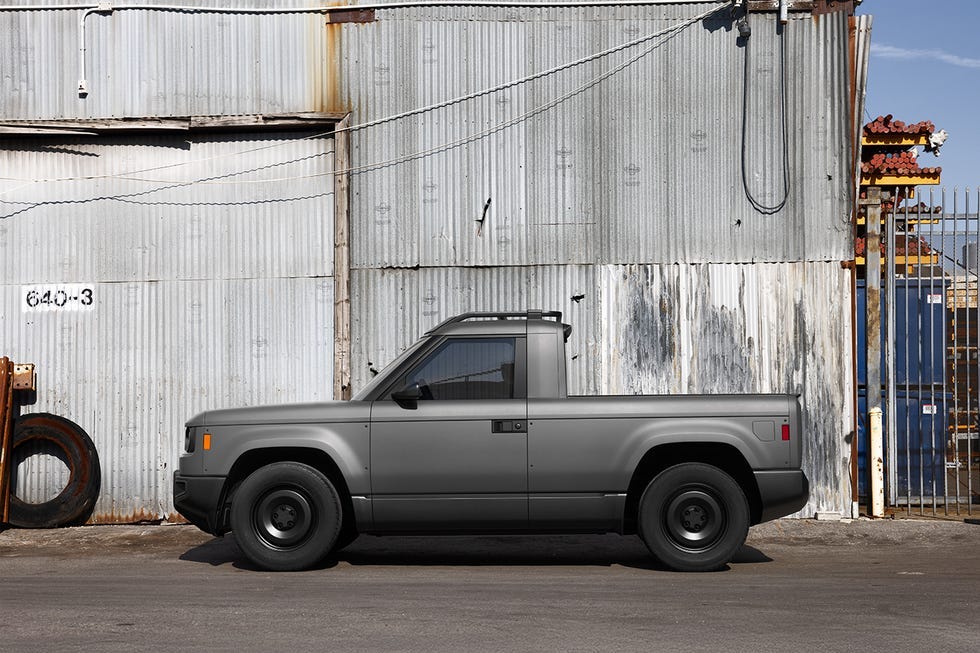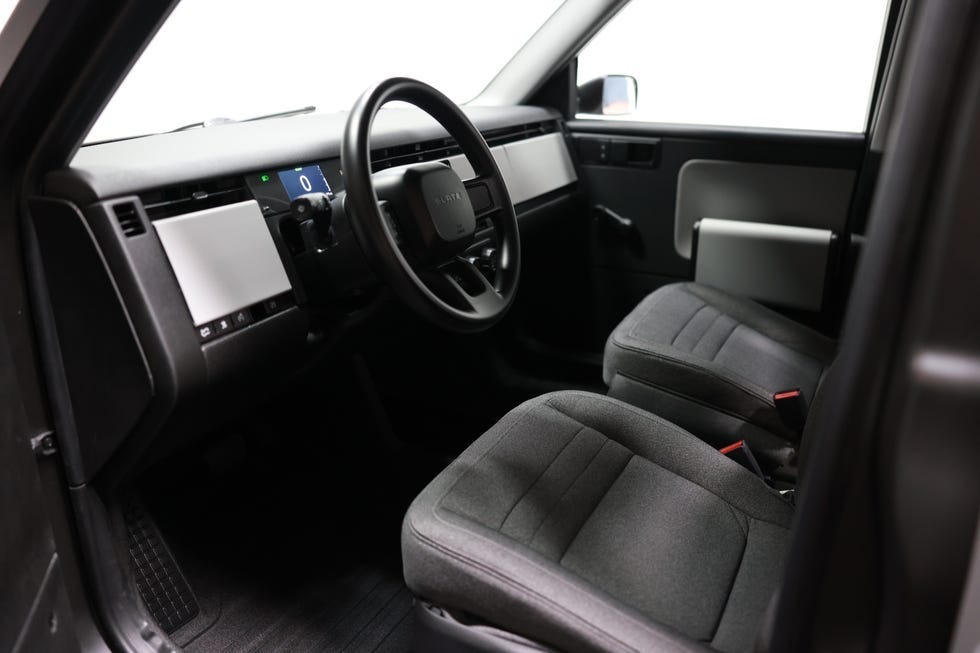This newsletter aims to separate the signal from the noise for investment in all things sustainable transportation: Electrification, mode shift, active and public transit, and mobility aggregation, across both people and goods movement.
This week’s Deep Dive looks at Slate Auto, with more details about how the electric pickup startup is adopting some “minimum viable car” concepts.
🌱STARTUP WATCH: Sustainable mobility startups (pre-seed or seed) to keep an eye on
Bulbul Drone Delivery (California, USA): Delivery drones for remote and rural areas
FreightiQ (Michigan, USA): Software to enhance the efficiency of freight brokerage
Magic Lane (Netherlands): Mapping and navigation for developers
RedGet.io (Bulgaria): Maritime software for GHG monitoring and compliance automation
TimeTick (California, USA): IoT software to improve EV charger reliability
Volektra (California, USA): Electric motors without rare earth metals
Volonaut (Poland): Manufacturer of personal hoverbikes
Wiser Machines (Georgia, USA): Software to improve the efficiency and sustainability of manufacturing processes
💰FUNDING: Capital raises from startups previously featured in Startup Watch
Kofa (Vol 8) raised $8.1M in a pre-Series A from E3 Capital, Injaro Investment Advisors, and others
Vonzu (Vol 10) was acquired by Moova; this is the 14th exit in the database
Phoenix Tailings (Vol 48) raised an additional $33M for its Series B from Builders Vision, Yamaha Motor Ventures, and others, bringing its Series B total to $76M
Pando Electric (Vol 61) secured a $5.4M grant from the California Energy Commission
Durin (Vol 92) raised a $3.4M pre-seed round led by 8090 Industries, with 1517, Andreessen Horowitz, Day One Ventures, Lux Capital, and others
Know someone who invests in startups in this space?
📰QUICK HITS: Notable news from the last two weeks
👩🏽⚖️Government, Policies & Cities
👮🏼♀️New York City may write criminal summonses, not traffic citations, for cyclists. The NYPD’s increased focus comes as e-bike and e-scooter usage continues to rise.
🤖 In the California Assembly, bill AB33 would require human drivers in autonomous vehicles delivering items to residences or businesses. One nuance lost here is how different a medium-sized Rivian van is from a Nuro-like delivery robot.
🌊 The Trump administration’s plan to approve seabed mining continues to create a backlash. The move pits the US against the UN-affiliated International Seabed Authority.
🐻 The US House of Representatives voted to rescind California’s ability to mandate heavy-duty truck emissions. California has made some concessions but still wants to push for only zero-emissions truck sales by 2036.
💸 The House has released its portion of the massive Republican policy bill. It includes gutting many existing programs and charging EV owners a $200 fee per year, versus $20 per year for those driving internal combustion engine vehicles.
🔬Markets & Research
✈️ Transport & Environment has a new report showing that European aviation emissions are back to pre-COVID levels and growing quickly. The report aims to close loopholes in European emissions measurement next year.
🏪 A new study looks at the importance of retail proximity in shopping behavior. Stores in close proximity don’t shift people away from e-commerce, but do increase the likelihood of walking rather than driving.
Not yet a subscriber?
🏭 Corporates & Later Stage
👀 Tesla’s board may have begun a search for a CEO to replace Elon Musk. Every board has its limits.
🤔 Legendary tech journalist Kara Swisher has suggested that the answer for Tesla is to buy xAI. The idea would firmly focus the company on AI and likely mean giving up the dream of being a leading carmaker.
🔋 Chinese battery giant CATL, not to be outdone by BYD, has proposed a 5-minute charging battery. Another sign of China’s dominance in the space…
🤖 Waymo noted that it’s willing to offer its robotaxis for personal ownership. If done at scale, this would majorly blunt one of Tesla’s few potential competitive advantages in the robotaxi wars.
😲 Ford has apparently canceled its fully-networked vehicle software brain that would have been crucial in new electrical architectures. This sort of software is no longer optional, so let’s hope Ford is lining up partners to supply this, similar to the Rivian/VW tie-up.
👟 Spanish renewable energy giant Acciona is making shoes out of recycled wind blades. That’s a way to turn old infrastructure into the original mobility product.
⚡️Lyft has revealed that over half of its bikeshare rides by members are now e-bikes. The company claims that e-bikes also help drive profitability.
⚖️ The FTC is suing Uber over its subscription product. An example of where consumer protection aligns with the bipartisan desire to reign in large tech companies.
🎪Uber is tying up with VW’s Moia unit to launch a robotaxi service. Uber has what feels like dozens of partners in the robotaxi space at this point.
🏎️ Nascar continues to roll out details about its upcoming electric race car. The league is committed to zero-emissions by 2035.
🐣 Startups & Early Stage
🚄 Brightline, America’s private passenger rail operator, posted a half a billion loss for 2024. Revenue is still growing rapidly, so here’s to hoping for a pathway to profitability.
🛩️ Swedish electric plane maker Heart Aerospace has decided to drop its Swedish operations and focus solely on the US. The company’s US HQ in Los Angeles will now become its global HQ.
📦 EAV, one of the leading players in building e-cargo bikes, has entered administration and accepted a buyout offer. Whether competitors like Fernhay and VOK can achieve profitable growth is still an open question.
🍩 Food truck franchisor DonutNV has launched its first battery-powered food truck. The battery systems come from Joule Case, a startup that has mostly financed via crowdfunding.
🚂 Carbon capture startup Remora is now firmly focused on decarbonizing rail. Remora’s solution would allow diesel trains to be retrofitted with carbon capture technology.
Enjoying this issue?
DEEP DIVE: Jeff Bezos is funding a would-be EV breakthrough
The last issue noted that “Slate was unveiled as a Michigan-based manufacturer of budget electric pickup trucks. Jeff Bezos is a major backer and many execs have a background at Amazon.”
Since then, Slate has gone on a full-throated PR offensive. One of the things that stands out about the message is how aligned it is with the concept of “minimum viable car.” For more, see the Deep Dive “Is Minimum Viable Car a Pipedream?” As Slate gears up to take down everyone from Tesla and Rivian to Ford and GM, here’s what we’ve learned:
Product: Slate is decidedly no frills: roll-down windows, manually adjustable rearview mirrors, no radio, no internet connectivity, and one paint color. A 53 kWh capacity battery pack comes standard, which should be good for about 150 miles of range. That compares to about 92 kWh from the comparable Rivian and 123 kWh from the Tesla Cybertruck. You are encouraged to pick from a huge list of options to customize to suit your tastes. Want something different than the slate gray exterior? Pay for a customized vinyl color wrap.
Price: Slate aims to sell its bare-bones EV pickup trucks starting at $27,500. If the federal EV tax credit sticks around, that means a $20K price. The average new car buyer in America pays ~$50K, with pickups often being significantly more expensive. The Rivian RT1 starts at $71K, the Tesla Cybertruck at $70K, and the Ford F-150 Lightning (electric) at $50K.
Manufacturing: Slate aims to begin delivery by the end of 2026, with the product built in a brownfield factory in Indiana. Interestingly, instead of buying one of the many idled car factories or going the contract manufacturing route, Slate bought an idled printing factory. While this approach requires massively investment, it suggests that a unique manufacturing approach may be vital in driving costs down below rivals like Rivian and Ford.
Leadership: The company eschews appointing anyone with the (co) founder title. CEO Christine Barman, a former Chrysler exec, is among the few women CEOs in the industry, even after over a decade of Mary Barra’s leadership at GM. The rest of the company’s leadership roster includes lots of folks from Amazon, Harley-Davidson, Tesla, and Rivian.
Funding: The company has closed a $111M Series A and has reportedly closed a Series B, though the size of that round hasn’t been disclosed. That suggests a lot more work to be done. Rivian, for example, raised $10B in private funding rounds.
Betting that the world needs yet another car manufacturer is always a huge leap of faith, even when you’re focused on disruptive innovation. As intriguing as Slate Auto is, don’t count out the competitive pressures from legacy players in the US (e.g., Ford Ranger), other startups like Telo Trucks, and, most importantly, the ever-looming threat from Chinese players like BYD.
Readers of the newsletter come from 90 countries. Not yet a subscriber?




I want one which makes me fear it's doomed
We need an electric minivan. Americans need to get over pickups. What is anyone going to put in that little box (to get rained on) that they couldn’t have carried in a minivan?